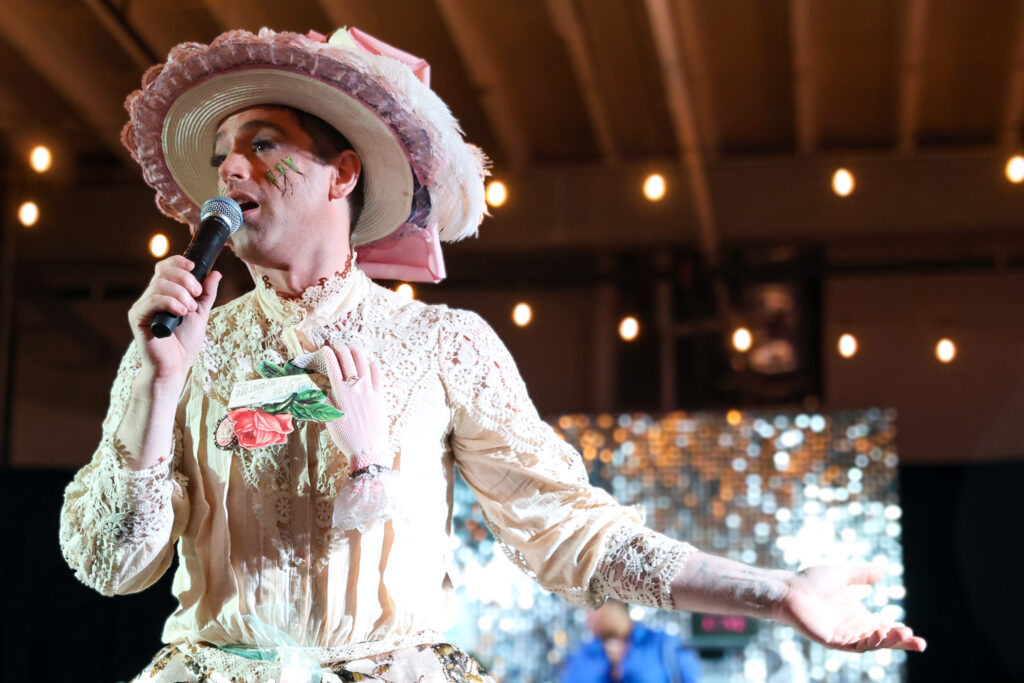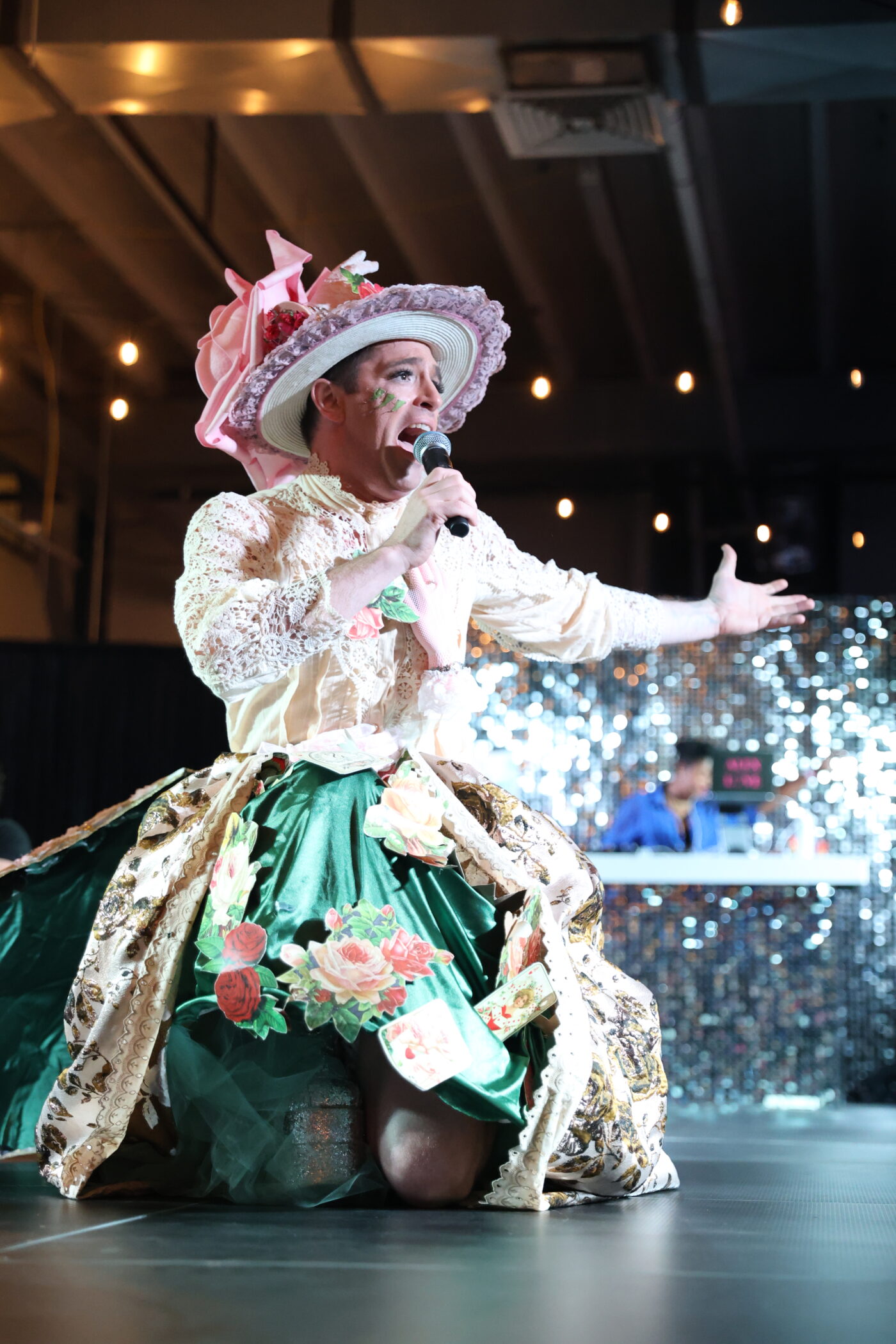The day John Jarboe came out as transgender to her aunt, she wasn’t met with words of affirmation. She also wasn’t met with angry, culture war-informed rhetoric that is sweeping the nation. She said something entirely different from what someone might expect.
“She said, ‘You know, John, you had a twin in the womb. You ate her. That’s why you are the way you are,’” Jarboe said. “I didn’t know that I had a twin in the womb, I knew that if I were assigned female at birth, I would have been called Rose. I just didn’t know that I ate Rose.”
This revelation, which would creep out almost anyone else, inspired Jarboe to go on her own journey of self acceptance through the catharsis of writing music. And so, out of a vanished twin, the musical “Rose: You Are Who You Eat” was born. Jarboe’s brainchild premiered Saturday at Woolly Mammoth Theatre Company and runs until June 28.
Describing it as a “light romp through cannibalism,” “Rose” follows Jarboe’s journey of discovery and embracing her gender identity for what it is through music and, of course, gender feasting. Jarboe made an effort to tap queer composers and creatives for this project, pulling together musical influences ranging from ‘80s power ballads to goth to classical Broadway.
“Rose” started as a solo project that looked more like a concert than a musical. Jarboe performed it for the first time in the basement of the Guggenheim, where it was discovered by CulturalDC’s Kristi Matthew.
Matthew first met Jarboe when visiting Philadelphia, where Jarboe is based out of. Jarboe’s cabaret company, The Bearded Ladies — which she founded and serves as the artistic director for — performs on their traveling stage, the Beardmobile, which made Matthew want to bring Jarboe to DC. After performing at one of CulturalDC’s mobile art galleries, Jarboe shared with Matthew that she was working on a project through residency at the Guggenheim — the early form of “Rose.” After the residency, “Rose” was brought to CulturalDC for a two night concert. Over the course of those two nights, Matthew became convinced that “Rose” needed to be a full production, and she knew Woolly Mammoth would be the best partner for a barrier-breaking show like “Rose.”
“I set out on what feels like it took like a year to get Woolly on board, but I knew that they were the right partner for this project because we both share a vision for non-traditional theater and pushing boundaries,” Matthew said.
Although Jarboe wrote “Rose” for the “queerdos” in the audience, her target audience was the guardians of queer kids.
“I built this piece for trans folks and queerdos and for the guardians of queerdos, and especially for people who identify as moms,” Jarboe said. “That’s who I built it for. But I think it tends to resonate pretty widely with people.”
Woolly Mammoth’s Artistic Director Maria Manuela Goyanes said that this show had been years in the making. Although it originally premiered in D.C. with the organization CulturalDC, she knew she wanted to bring it to her Tony award-winning stage.
“The show is just, I don’t know, heart filled and just soul expanding,” Goyanes said. “You’re gonna walk out and sort of understand something around sort of the beauty of gender actually not how hard it is and how difficult or complicated it is, which it all is it is that for sure … That’s basically the beauty of it, and (‘Rose’ shows) what it means to really sort of learn how to be who you are.”
I built this piece for trans folks and queerdos and for the guardians of queerdos, and especially for people who identify as moms. That’s who I built it for. But I think it tends to resonate pretty widely with people.
Apart from one master of fine arts student in New York, Jarboe said the idea of gender feasting and gender cannibalism has spawned because of “Rose.” However, using the idea of consumption in “Rose” came naturally because of how universal it is.
“A lot of my work has involved eating and food and those things that are visceral, and I just think eating is something we all do,” Jarboe said.
The idea of media consumption and representation were incredibly influential for “Rose,” Jarboe said. Her own experience of consuming LGBTQ+ media was incredibly restricted.
“In the Midwest, it wasn’t a very nutritious diet,” Jarboe said. “Especially growing up in a republican Catholic family. The only queer images I had were Norman Bates, Jeffrey Dahmer and Ellen. You’re like, Oh, God, am I evil? Am I a talk show host?”
Finding who your idols are and how you “consume” them was also an integral part of building “Rose,” Jarboe said. For her, those idols are people like John Cameron Mitchell, Grace Jones and individuals in the genre of queer theatre like Taylor Mac.

However, Jarboe said she is impressed by the younger generations of queer people and how open they are to questioning their identities, but is happy that the metaphor of eating presented in “Rose” still resonates with them.
“I’ve been processing it for so long. Like, I feel behind when I talk to the younger generation, and grateful for their lessons,” Jarboe said. “But yeah, I guess that metaphor of eating is really useful. And I think a lot of people can resonate with it, no matter how they identify, or where they’re coming in.”
Unlike traditional musicals, “Rose” starts as soon as ticket holders enter Woolly Mammoth’s doors and doesn’t stop when the curtain closes. Jarboe and Woolly Mammoth partnered with CulturalDC to create an immersive experience for people after the show, including a short film, easter eggs from the show and “Rose’s Closet” where you can “take a gender, leave a gender” for free.
“Before the show, or after the show, if you’re feeling like you want a new outfit, or if you’re feeling a little dysmorphia,” Jarboe said. “Like, ‘I just did a sing-along about gender and I really, really need a tie.’ But you can get a tie. And it’s free. So you can also drop off your gender relics there too for other people.”
“Rose” has received immense critical acclaim so far, taking the D.C. theatre scene by storm upon its first show. Praised by The Washington Post as “captivating and unhinged” and by Broadway World as “a sensational orgy of gender,” Jarboe’s journey of self-reflection and gender feasting was a succulent success. While this might be surprising for some considering the subject matter, Matthew knew this was going to be a hit for all audiences.
“I think it’s been really interesting to kind of the conversations that have come out of the show and the connections that John’s been able to make with a variety of different communities,” she said.
After Jarboe’s last show in D.C., she plans on going back to her cabaret company in Philadelphia, PA. When “Rose” officially came to Woolly’s stage, The Bearded Ladies were some of Jarboe’s biggest supporters, alongside other “Rose” composers Emily Bate, Daniel De Jesús, Pax Ressler and Be Steadwell.
“I don’t think anyone really takes a gender journey alone,” Jarboe said. “I think and I was fortunate enough to have a lot of amazing collaborators at various points in their journeys, helping me through.
“It’s not just a one cannibal show,” she said.
To listen to Monica Alford’s full conversation with Jarboe, click here. To listen to Alford’s full conversation with Matthew and Woolly Mammoth Creative Director Kristen Jackson, click here. To listen to Alford’s full conversation with Goyanes, click here. To view Maggie Van Fleet’s photos from Wild Side Media’s Walk on the Wild Side Pride Party, click here.
